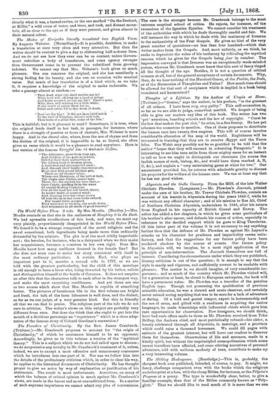The Founders of Christianity. By the Rev. James Cranbrook. (Trfibner.)—Mr.
Cranbrook proposes to account for " the origin of Christianity," of which he announces himself to be an opponent. Accordingly, he gives us in this volume a version of the "mythical theory." This is a subject which wo do not feel called upon to discuss ; we do notperceive any novelty in Mr. Cranbrook's treatment of it, unless, indeed, we are to except a most offensive and unnecessary coarseness which he introduces into one part of it. Nor can we follow him into the details of the preliminary criticism which, in order to clear his way, ho applies to the historical documents of Christianity. He has thought proper to give no notes by way of explanation or justification of his statements. The result is most unfortunate. Assertions, on many of which the balance of critical opinion is much against Mr. Cranbrook's views, are made in the barest and most unconditional form. In a matter of such supreme importance we cannot admit any plea of convenience. The case is the stronger because Mr. Cranbrook belongs to the most extreme sceptical school of critics. He rejects, for instance, all the recensions of the Ignatian Epistles. We cannot consider his treatment of the authorities with which he deals thoroughly candid and fair. We will instance the way in which he deals with the testimony of Irenams to the authenticity of the Four Gospels. He gives no hint of the very great number of quotations—no leas than four hundred—which that writer makes from the Gospels. And, most unfairly, as we think, he seeks to depreciate the value of his testimony by ridiculing the mystical reasons which he gives for the Gospels being four in number. The impression conveyed is that Irenseus was an exceptionally weak-minded person, whereas Mr. Cranbrook must know that this sort of fancy tinged all the thought of the age. Besides, it is not a question of critical acumen at all, but of the general acceptance of certain documents. Why, then, do we hear nothing of the Muratori Canon, of the Peshito, the It ala, or of the Harmonies of Theopbilus and Tatian ? How much time should be allowed for that sort of acceptance which is implied in a book being translated and harmonized?






























 Previous page
Previous page